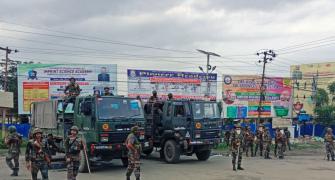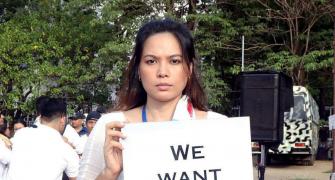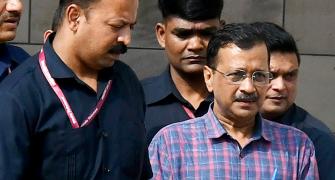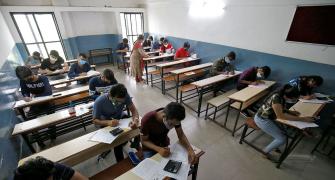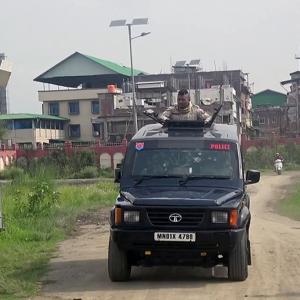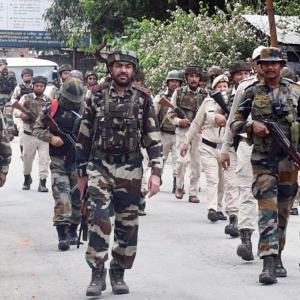'The Centre prevaricates on the question of effecting a change of state-level leadership or on the imposition of President's rule in the state.'

Indefinite shutdowns and ethnic killings have returned to Manipur once again.
The trouble that started on May 3 between the two major communities of Manipur, Meiteis and Kukis, seems to be never ending.
The situation has become so serious that the central government had no option but to bring back the Armed Forces Special Power Act (AFSPA) in the state though it has excluded 19 police stations falling under the purview of the Imphal valley from the legislation.
Chief Minister N Biren Singh's Bharatiya Janata Party government has failed to control the law and order situation and blamed the nation's enemies for disturbing the peace in the state.
'The current crisis in Manipur is not a clash between ethnic groups and not a law-and-order issue of the state, but purely a war against the Indian Union by Myanmar- and Bangladesh-based Kuki militants in collaboration with militant groups operating in Manipur,' Biren Singh said (external link).
To know more about the situation in Manipur, Syed Firdaus Ashraf/Rediff.comspoke to Professor Kham Khan Suan Hausing, former head, department of political science, University of Hyderabad, and senior fellow, Centre for Multilevel Federalism, Institute of Social Sciences, New Delhi. Professor Hausing made it clear that the views expressed by him in the interview are personal.
Why has the situation in Manipur once again gone from bad to worse?
The situation in Manipur has gone from bad to worse following the circulation of a photo which allegedly confirmed the death of Luwang Linthoingambi Hijam (17) and Phijam Hemjit (20), who went missing since July 6.
Large-scale violent rioting in Imphal and other valley areas compelled the state government to shut down Internet service for another five days. The state swiftly pressed the service of the CBI led by its special director Ajay Bhatnagar to investigate the matter.
This is not surprising as the BJP's double-engine sarkar has miserably failed to disarm militant groups and recover over 5,000 automatic rifles and 600,000 rounds of live ammunition.
The failure to resolve the problematic division of labour between the state police and the central paramilitary forces in managing law and order where the latter merely plays a subservient role to the former suggests that law and order shall continue to remain precarious.
The massive distrust and hostile attitude displayed by civil society groups in the valley areas towards the central paramilitary forces, especially the Assam Rifles, on the one hand, and the uneasy relation between the state police and Assam Rifles on the other hand are not particularly amenable to effective restoration of law and order.
This means that agent provocateurs will exploit the fragile law and order situation to further their militant agenda on a whim. That this matter was flagged as a 'kidnap and murder' case allegedly in a Kuki-Zomi area in Lamka (Churachandpur) thickens the plot and may put law and order for a full toss in Manipur for quite some more time.
From May till September, was there any time when there was a hope that normalcy would return to the state? If yes, why was that opportunity lost?
Yes, towards the end of May when both the Chief of Army Staff General Manoj Pande and Union Minister of Home Affairs Amit A Shah visited Manipur, it was widely expected that normalcy would return to the state.
The idea and practice of 'buffer zones' which emerged from these visits was expected not only to insulate the hills from aggressive militant attacks from the valley areas but also to establish a semblance of law and order pending a political solution to the impasse.
Although the buffer zones considerably helped in securing the hills from violent armed attacks, they have not succeeded in establishing peace.
The opportunity for peace and normalcy was lost because the state government continues to play a partisan role in the violence.
The central government also does not seem to be serious in resolving the conflict. It prevaricates on the question of effecting a change of state-level leadership or on the imposition of President's rule in the state.
Absent President's rule or the imposition of the Armed Forces (Special Powers) Act (AFSPA) in the valley areas, massive deployment of central forces is not likely to secure law and order as their hands are continued to be tied from behind.
Are relations between Kukis and Meiteis permanently damaged? Is there any chance that the trust between these two communities can be restored?
Unfortunately, the relations between Kukis and Meiteis have been badly damaged. I will not, however, foreclose the possibility of restoring trust between the communities in the future. This, however, will depend on navigating a more capacious politics where politics is harnessed as the art of the possible.
If you can explain to a common man why the Kukis and Meitei are fighting, what would be your answer?
What is it that the Kukis want which the Meitei community does not want to part with, and what do the Meiteis want which the Kuki community cannot part with?
At the risk of oversimplification, the Manipur violence since May 3, 2023, is principally centred around contestation and control over land and its resources.
While the Kuki-Zomi group considers the Meiteis' demand for Scheduled Tribe status as a camouflage by the latter to have direct control and ownership over tribal lands, the Meiteis consider unacceptable binary land laws where they are, unlike the tribals, precluded from having direct control and ownership over land in the tribal hill areas.
Also allowing the state to capitulate to powerful social forces and allowing the latter to dictate not only the terms of political discourse, but also of law and order in the state are equally responsible for perpetuating this violence.

